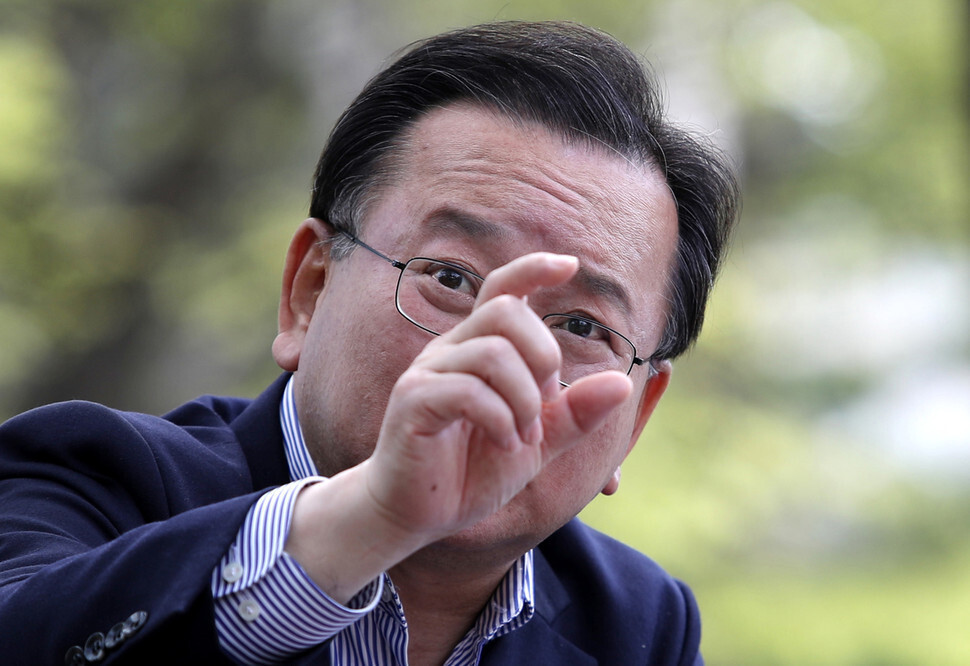hankyoreh
Links to other country sites 다른 나라 사이트 링크
Kim Boo-kyum reflects on election defeat in hometown of Daegu

“A farmer doesn’t blame the field.”
This was the message uttered by late former President Roh Moo-hyun upon his defeat as a candidate for the National Congress for New Politics (predecessor of the current Democratic Party) in the 16th National Assembly election 20 years ago, where he had left Seoul’s Jongno area to run in the riskier climate of Busan.
On the evening of Apr. 15, counting was under way for votes in the 21st National Assembly election. The gap was widening between Kim Boo-kyum, a Democratic Party candidate running in Daegu’s Suseong A district, and United Future Party candidate Joo Ho-young. Kim arrived at the election office to find the atmosphere subdued. Addressing his tearful supporters, he said, “A farmer doesn’t blame the field. The reality of defeat needs to be accepted as the reality. A farmer has to spread the right fertilizer and toil to suit the land’s conditions; as a farmer, I didn’t have a precise understanding of my field.”
As his defeat became more and more certain, he posted a message to his Facebook page early in the morning on Apr. 16. “I will regard today’s defeat as a major lesson in my political life,” he wrote.
“My dedication to Daegu will not change. I will not stop working to overcome regionalism and achieve politics of unity,” he added.
“I may have failed as a farmer today, but I will till the field of South Korean politics more deeply. I will devote even more efforts to turn Yeongnam [South and North Gyeongsang Province, along with the cities of Busan, Daegu and Ulsan] into a fertile field,” he pledged.
The Democratic Party won a landslide victory in the general election, but Kim’s failure to be re-elected in Daegu went down as a painful moment. This has to do with his estimable efforts in walking away from the relative security of his Greater Seoul constituency (Gunpo) to struggle for nearly a decade in his hometown of Daegu. With the regional divisions between the provinces of Gyeongsang and Jeolla only intensified in the election, “TK Kim Boo-kyum” – “TK” a reference to Daegu and North Gyeongsang Province, both traditional conservative strongholds -- was a must-hold asset for the Democratic Party. Going forward, Kim appears likely to remain registered in Daegu as he seeks out a role for himself as a national politician.
“He’s going to start thinking about what role he can play within the party as he observes the trends leading up to the party convention in August,” one of his associates explained.
By Seo Young-ji, staff reporter
Please direct comments or questions to [english@hani.co.kr]

Editorial・opinion
![[Editorial] Korea must respond firmly to Japan’s attempt to usurp Line [Editorial] Korea must respond firmly to Japan’s attempt to usurp Line](https://flexible.img.hani.co.kr/flexible/normal/500/300/imgdb/original/2024/0514/2317156736305813.jpg) [Editorial] Korea must respond firmly to Japan’s attempt to usurp Line
[Editorial] Korea must respond firmly to Japan’s attempt to usurp Line![[Editorial] Transfers of prosecutors investigating Korea’s first lady send chilling message [Editorial] Transfers of prosecutors investigating Korea’s first lady send chilling message](https://flexible.img.hani.co.kr/flexible/normal/500/300/imgdb/original/2024/0514/7917156741888668.jpg) [Editorial] Transfers of prosecutors investigating Korea’s first lady send chilling message
[Editorial] Transfers of prosecutors investigating Korea’s first lady send chilling message- [Column] Will Seoul’s ties with Moscow really recover on their own?
- [Column] Samsung’s ‘lost decade’ and Lee Jae-yong’s mismatched chopsticks
- [Correspondent’s column] The real reason the US is worried about Chinese ‘overcapacity’
- [Editorial] Yoon’s gesture at communication only highlights his reluctance to change
- [Editorial] Perilous stakes of Trump’s rhetoric around US troop pullout from Korea
- [Guest essay] Preventing Korean Peninsula from becoming front line of new cold war
- [Column] The state is back — but is it in business?
- [Column] Life on our Trisolaris
Most viewed articles
- 1Ado over Line stokes anti-Japanese sentiment in Korea, discontent among Naver employees
- 2[Column] Samsung’s ‘lost decade’ and Lee Jae-yong’s mismatched chopsticks
- 3Korean opposition decries Line affair as price of Yoon’s ‘degrading’ diplomacy toward Japan
- 4US has always pulled troops from Korea unilaterally — is Yoon prepared for it to happen again?
- 5Korean auto industry on edge after US hints at ban on Chinese tech in connected cars
- 6[Editorial] Yoon’s gesture at communication only highlights his reluctance to change
- 7[Correspondent’s column] The real reason the US is worried about Chinese ‘overcapacity’
- 8[Column] Will Seoul’s ties with Moscow really recover on their own?
- 9[Photo] Korean students protest US complicity in Israel’s war outside US Embassy
- 101 in 3 S. Korean security experts support nuclear armament, CSIS finds